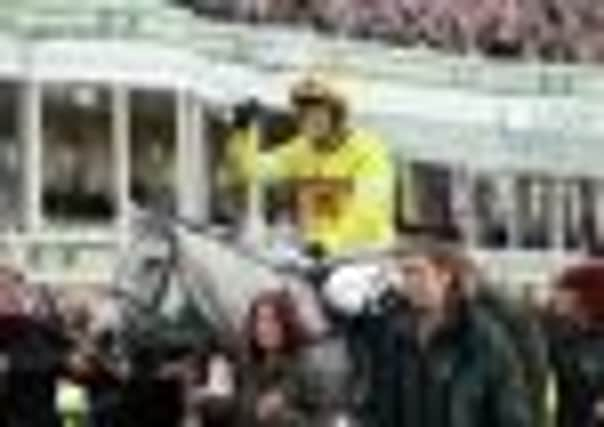Tears shed as Yorkshire’s ‘rags-to-riches’ star dies in National


The 11-year-old, who was in a prominent position under his young jockey Harry Haynes, had to be humanely destroyed after breaking a shoulder when brought down by a faller at Becher’s Brook, the most controversial fence in racing.
Becher’s also claimed Gold Cup winner Synchronised on the first circuit; AP McCoy’s mount galloping free before fracturing a leg several fences later and having to be put down.
Advertisement
Hide AdAdvertisement
Hide AdThe tragedies increased the number of equine fatalities in the race to six in the past five renewals, and overshadowed the National’s closest ever finish with Neptune Collonges beating Sunnyhill Boy by a nose.
It was the only time that the Daryl Jacob-ridden grey was in front – the rider later admitted that he had no idea about the winning post’s whereabouts – and the 11-year-old horse was immediately retired by owner John Hales.
Yet, as racing’s authorities launched a safety review, and the RSPCA demanded further modifications to reduce the risks, According To Pete’s owner Peter Nelson, a Helperby mechanic, and trainer Malcolm Jefferson could not hide their personal loss. Neither, though, blamed the Aintree authorities.
“If I had the chance, I don’t think I would run a horse again,” said Nelson who bred the ill-fated horse. “He was a wonderful horse, a wonderful character and all of the village admired him. The amount of letters and phone calls we’ve had already is unbelievable.
Advertisement
Hide AdAdvertisement
Hide Ad“We knew he had fallen and thought he had just kept going. As the runners returned, he didn’t come in. I went to ask one of the course lads and he phoned down and said he was in the horse ambulance. I asked ‘how bad?’ He said ‘bad’. There are people crying at my door now. You can’t believe it. We thought the world of him, we’ve had him since a foal. He was a family pet more than a horse, Malcolm watched the replay and said there was a million to one chance of it happening.”
Jefferson, whose two Cheltenham Festival winners had both prevailed at Aintree on the first two days of the National meeting, was disconsolate, saying his stable star was in a potentially winning position when tragedy struck.
“Terrible, horrible. He was loving it. He was having the time of his life. He was going so well and Harry was so pleased with him. To me, the horse was a friend,” said the Norton trainer. “It is just one of those things – and it could have happened anywhere. What do you do?
“Harry came in this morning and he was in tears. It has hit him hard because this horse got him going again after injury, winning the Rowland Meyrick and Peter Marsh Chases.”
Advertisement
Hide AdAdvertisement
Hide AdJefferson said he hopes the inquiry now underway will be proportionate and not overtaken by any ‘ban the National’ bandwagon.
“Horses love racing and they do it because they love it,” said the trainer. “You can’t make a horse run faster if they don’t want to and Pete always did his best... always.”
As winning trainer Paul Nicholls paraded Neptune Collonges yesterday, he said: “We are always learning and we are going to keep learning and try to improve.”
The British Horseracing Authority inquiry now underway will inevitably focus on Becher’s Brook where the unfortunate Dooneys Gate died last year. The drop on the landing side was raised by several inches – but it still did not prevent heartbreak at the fence. It will also focus on injuries sustained by Weird Al and Killyglen in the race.
Advertisement
Hide AdAdvertisement
Hide AdHowever, RSPCA equine consultant David Muir said his organisation did not want the National banned.
“We need to consider the number of runners, the number of fences, the length of the race and the type and design of the jumps,” he said. “I am not happy about drop fences and Becher’s is a drop fence. Is the race cruel? No one puts a horse into this race to see it suffer or die for their own gratification. That would be a definition of the word ‘cruel’.
“We’ve said it before, the death of a horse is the unacceptable face of horse racing. There is an impetus for change, which started last year and included changes to whip use, and now the impetus has to be taken on board.”
Professor Tim Morris, director of equine science and welfare for the BHA, said: “The Grand National undoubtedly represents a challenge to both horse and rider. It has inherent risks, but, working closely with Aintree, we do all we can to minimise these risks while maintaining the unique character of the race.”